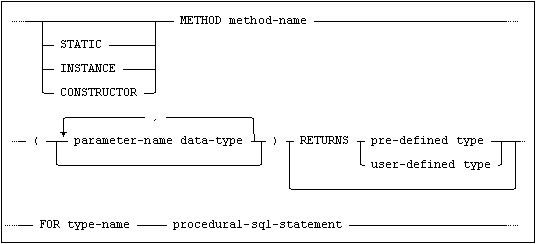Create a method for a user-defined type.

where method-definition is:

Usage
Embedded, Interactive, Module, ODBC, JDBC
Description
Creates a new method. A method returns a single value and can thus be used wherever an expression is allowed. A method is always associated with a user-defined type. Before a method can be created, there must exist a method specification for the type with matches the method with regard to parameters and result type. (As it is possible to have method specifications with parameter overloading there must be an exact match.) Method specifications are created using the CREATE TYPE statement (see CREATE TYPE), or using the ALTER TYPE statement (see ALTER TYPE).
If no method type is specified, instance is default. See Mimer SQL Programmer's Manual, Invoking Methods.
The specific name for a method can be retrieved by using the information_schema views.
A specific name can be used in DROP, GRANT and REVOKE statements. It is particularly useful when dealing with routines with parameter overloading. Instead of having to specify a list of data types, in order to distinguish the routine, the specific name can be used.
If no schema name is specified, the method is created in a schema with the same name as the current ident. The ident creating the method must be the owner of the schema. It is only the creator of a user-defined type that can create methods for that type.
The parameter names should follow the normal rules for naming SQL identifiers. All parameters have the parameter mode IN. The data type for a parameter may be a predefined type (see Data Types in SQL Statements) or a user-defined type. The same applies to the result type for the method.
Within the routine body of an instance or constructor method it is possible to use SELF to reference to the actual object that invokes the method.
In a constructor method the attributes have their default values as specified in the CREATE TYPE statement.
Restrictions
If the method specification for the method is DETERMINISTIC the routine-body may not contain references to SESSION_USER, CURRENT_PROGRAM, CURRENT_DATE, LOCALTIME, LOCALTIMESTAMP and BUILTIN.UTC_TIMESTAMP. It is also not possible to invoke procedures, functions or methods that are deterministic.
Likewise the access option for the method specification will govern which operations that are allowed.
Standard Compliance
|
Standard |
Compliance |
Comments |
|---|---|---|
|
SQL-2016 |
Core |
Fully compliant. |
|
SQL-2016 |
Features outside core |
Feature S027, “Create method by specific method name” |